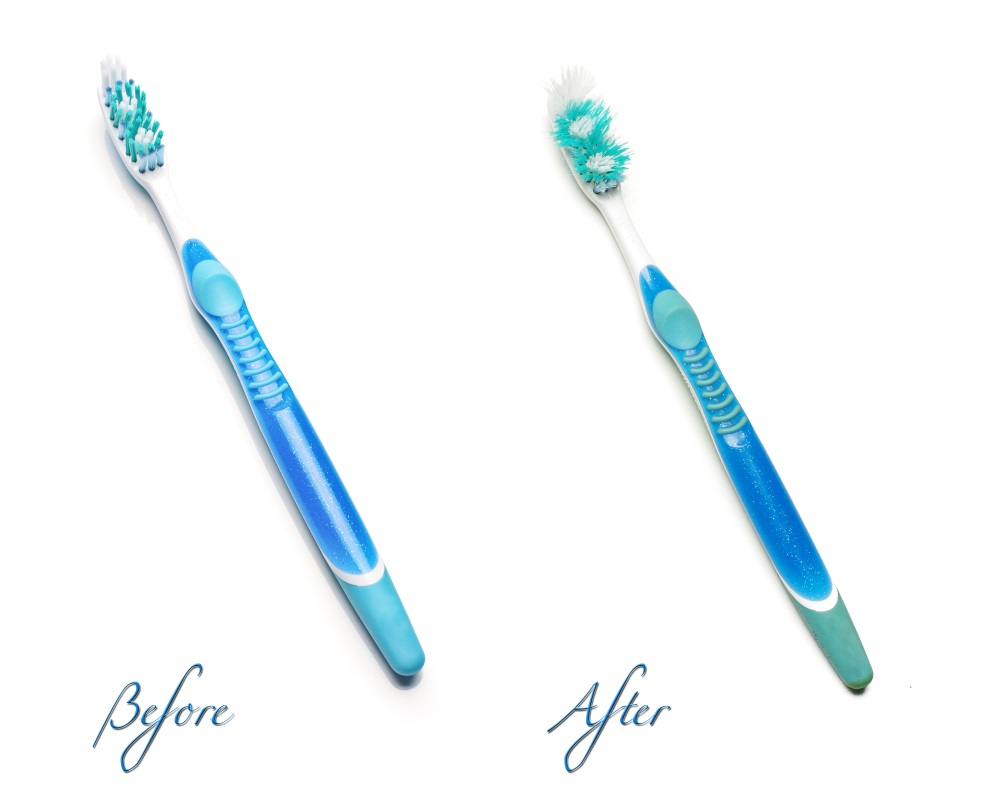How Do You Know When to Replace Your Toothbrush?
When you look at your weekly shopping list, you probably have those same, staple items every week: milk, bread, cereal…or whatever it is your household eats most. But how often are products like toothbrushes, floss or toothpaste on your list? If we at Dr. Ku’s office had to guess, we would bet it’s less often than most other hygiene products like toilet paper or even shampoo.
While running out of toothpaste is a good kick in the pants to head to the store to purchase dental products in general, what is the harm in stretching out the longevity of your toothbrush? If you’re trying to justify sticking with your old toothbrush, maybe you think you’re being more environmentally friendly, since most will just get thrown into landfills. Or maybe you just don’t want to spend another four bucks for a new one. In most cases, you might simply forget!
Unfortunately, the truth of the matter it that it’s hugely important to replace oral hygiene items on a more regular basis than you might realize—and that includes your floss! Next time you’re at our Fort Worth office, make sure to ask for a couple extra toothbrushes (we have tons!) to store at home for future quick access.
Replacing your toothbrush
Think about your bathroom. What do you suppose is the grimiest surface? The toilet bowl? The door knob? The back corner of the shower?
Think again!
A new bathroom cleanliness study from the American Society for Microbiology showed that toothbrush storage containers rank at the top of the list of those dirtiest surfaces in a bathroom. If knowing your toothbrush is sitting in one of those containers doesn’t make your run to the store to purchase a new one, think about the germs from your recent cold or flu that might be lingering on the bristles.
Dental PSA: It’s possible to re-infect yourself with your toothbrush after you’ve been sick. If you were afflicted with strep throat, for example, a colony of streptococcal bacteria might end up on your toothbrush and remain there long enough to give you a second case after you’d taken a course of meds.
In addition, it’s possible to catch a cold, a bacterial infection, or even a blood-borne disease such as Hepatitis B or C from someone else’s toothbrush. (It’s an especially bad idea to use a sick person’s toothbrush while the bristles are still wet.) Even if you don’t put it in your mouth, the infected item might contaminate another toothbrush nearby. When two toothbrushes are stored in the same cup, their bristles sometimes come into contact.
A dirty toothbrush might also pass bacteria or virus particles to the rim of a toothpaste tube, and then on to another toothbrush from there. Therefore, strictly for germ purposes, it’s important to replace your toothbrush after every illness or if your toothbrush comes into contact with the toothbrush of anyone else who’s sick.
When do you replace your toothbrush if you HAVEN’T been sick?
Even if you’ve been lucky and spared from illness for the last three or four months or more, that doesn’t mean that your toothbrush is still safe or effective to use. The American Dental Association (ADA) suggests changing your toothbrush (or the head on an electric toothbrush) about every three months. If you are following the twice-a-day brushing guidelines (which Dr. Ku sure hopes you are), you’ll see bristle breakdown beginning at the three–month mark.
Normal wear and tear on a toothbrush makes bristles much less effective at removing plaque from your teeth. They also lose some of their ability to get into the hard–to–reach places because they’re too soft.
Here’s how you know when it’s time to replace your toothbrush: if, after you brush your teeth and run your tongue over them, they don’t feel slippery and smooth, then your brush is not doing its job. Toss it and pick up a new one.
Remembering to buy floss
Let’s be real: the number of people that floss daily is not high. Less than 40% of adults claim to floss once a day, with 20% of people admitting to never flossing at all. Most dentists hear a range of excuses for not flossing, from not having enough time to the actual act hurting or teeth that are too close for floss to fit. But really, none of these are valid excuses, and not flossing will ultimately do significant harm to your mouth.
Think about it like this…if you’re only brushing your teeth, you’re only getting them 60% clean. I think we can all agree that flossing is important when we look at it like that, and one way to ensure you have no excuses is to make sure your bathroom cabinet always has an extra box.
There’s no reason to have only one pack of floss at home your house—it doesn’t exactly go bad, after all! Either purchase in bulk (and get the discounts) or buy several packs at once at the store. This is a good thing to store in a guest bathroom for visitors, too, who might have forgotten their own. Having an extra can also come in handy when you suddenly run out. It only takes a few days of skipping this good habit for your behavior to change, and it will be become more likely then that flossing falls out of your oral health routine.
Don’t forget the toothpaste!
Forgetting to buy toothpaste is a little harder than floss, since brushing is much more engrained in our daily habits than flossing. But what happens if you get to the store and they don’t have your favorite toothpaste? Whether its gel vs. paste or the flavor is wrong, is it good for your teeth to mix up what you’re using, or should you stick to your old favorites?
Generally speaking, there’s no need to change your toothpaste if you’re not using a medicated paste. Another reason you could consider switching toothpastes is if you’re using a whitening toothpaste, since prolonged use of this can damage your teeth. On toothpaste, the bottom line is that most include the exact same ingredients. So, above all, choose a flavor and texture that you’re guaranteed to stick with!






